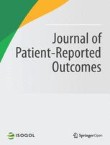Peer-review is the system used to assess the quality of a manuscript before it is published. Independent researchers in the relevant research area assess submitted manuscripts for originality, validity and significance to help editors determine whether the manuscript should be published in their journal. You can read more about the peer-review process here.
Journal of Patient-Reported Outcomes operates a double-blind peer-review system, where the reviewers do not know the names or affiliations of the authors and the reviewer reports provided to the authors are anonymous.
The benefit of double-blind peer review is that it allows reviewers to judge the manuscript based on content alone, and they are not unconsciously biased by knowledge of who the authors are.
Submitted manuscripts will generally be reviewed by a minimum of two experts who will be asked to evaluate whether the manuscript is scientifically sound and coherent, whether it duplicates already published work, and whether or not the manuscript is sufficiently clear for publication. Reviewers will also be asked to indicate how interesting and significant the research is. The Editors will reach a decision based on these reports and, where necessary, they will consult with members of the Editorial Board.
